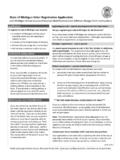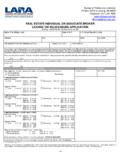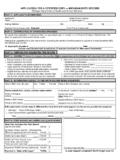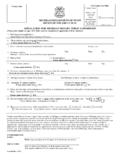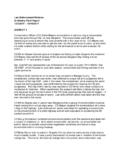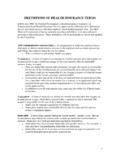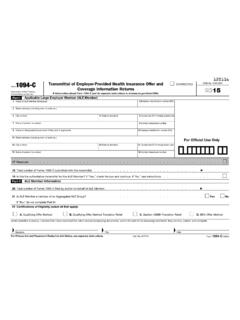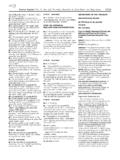Transcription of Michigan Consumer Guide to Health Insurance
1 Michigan Consumer Guide to Health Insurance This Guide was produced by the State of Michigan ,Department of Insurance and Financial Services (DIFS) through a federal grant provided by the Department of Health and Human Services. To order copies of this Guide , e-mail Find more information at Toll-free: 877-999-6442 This Guide was printed June 2014. Portions of the text may be out of date; be sure to check the DIFS website or contact the appropriate program administrator for the most current information. Table of Contents Introduction ..2 Employer Group Coverage ..3-4 Types of Health Plans .. 10-11 Shopping for Health Coverage or Comparing Health Plans.
2 12-13 What Medical Care Must My Health Carrier Pay For? .. 14-17 Paying Medical Bills .. 18-19 Switching from One Health Plan to Another ..20-21 Understanding the New Health Care Law ..22-23 Health Insurance Marketplace .. 24-25 Individual Coverage ..5 Medicare, Medicare Supplement and Medicare Advantage Coverage .. 6-9 What to Do if Your Claim is Denied ..26 Health Coverage Grievances and Appeals .. 27-28 Glossary of Health Coverage and Medical Terms .. 29-32 Complaint Form ..33 External Review Form ..34 Important Contact Information .. 35-36 Introduction The Michigan Department of Insurance and Financial Services (DIFS) is the agency responsible for regulating Michigan s financial industries, including Health Insurance companies, products and agents.
3 This Guide provides consumers with information about the basics of Health coverage so Michigan residents can make informed decisions . There are several types of Health Insurance policies and Health care plans with many different features available . Individual coverage can be purchased directly by the Consumer or group Health coverage can be obtained through an employer . Health carriers provide Health coverage through several different entity types, the most common are Health insur-ance companies or Health maintenance organizations (HMOs) . Throughout this Guide Health carrier will mean any one of these entity types. When there is a difference between entities, the Health carrier type will be specified.
4 In addition to educating consumers about the industries it regulates, DIFS licenses Health carriers and agents, makes sure the carriers are financially sound, reviews policies for Consumer protections, and investigates potential violations of Insurance law by companies and agents . DIFS reviews Health coverage rates for individual Health plans, small employer group plans, HMOs and other types of coverage . DIFS investigates complaints against Health carriers or Insurance agents to ensure that they have followed their contract language and complied with all Insurance rules and laws . Additionally, under the Patient s Right to Independent Review Act (PRIRA), DIFS provides policyholders with appeal rights due to adverse decisions made by Health carriers regarding a denial, reduction, or termination of Health care services.
5 2 Employer Group Coverage An employer is not required to provide Health coverage to employees or their dependents . However, under the Affordable Care Act, starting in tax year 2015, an em-ployer with 100 or more employees may be assessed a tax penalty for coverage not offered to its full-time employees and their dependent children . Additionally, the employer may have to pay a tax penalty if they don t offer affordable coverage that provides minimum value for at least 70 percent of their full-time employees and their dependents in 2015 . In 2016 the required percentage is 95 percent of covered employees and the requirement to provide coverage or pay a penalty applies to employers with 50 or more employees.
6 Additionally under the Affordable Care Act, there are requirements for non-grandfathered employer Health plans, including limits on out-of-pocket expenditures and waiting periods, no annual or lifetime dollar limits on coverage of essential Health benefits, no cost-sharing for preventive ser-vices, and offering coverage to adult children up to age 26 . In group coverage, the employer is the master policy-holder and the employees are certificate master policyholder negotiates the terms of the group policy with the Health carrier . The master policyholder can reduce or change the benefits and coverage, increase the employee share of the premium cost, switch Health carriers or stop providing coverage entirely.
7 The master policyholder determines who has coverage and makes requests to the Health carrier for additions or deletions of employees from the plan . Some employers offer more than one plan for coverage and the employees may choose which plan best meets their needs or is most cost-effective for their situation .All group Health care contracts must include specific minimum benefits required by Michigan law. For more information, see page 14 in this Guide . Employee Premiums Coverage and rates may change annually . The employer decides what portion of the coverage is paid by the em-ployees . In some cases, the Health carrier may require that the employer pay a minimum percentage of the premium.
8 However, under the Affordable Care Act for the employer-based coverage to be considered affordable, the employee s premiums for the plan s employee-only option must be less than nine and a half percent of the employee s annual household income . To offer minimum value, the plan must pay at least 60 percent of the medical costs for services the plan covers . If either one of the above does not apply, then the employee may receive a tax credit toward the purchase of Insurance in the Health Insurance Marketplace and the employer may be subject to a tax penalty . Enrollment Employees should be aware of the employer s group enroll-ment policies.
9 Employers can require a waiting period not longer than 90 days before group coverage is first effective for new employees or before they can enroll in the cover-age. Employees should be aware of any deadline when first applying for the group coverage . Employers have an annual open enrollment period for employees to add or change coverage . Employer changes in the group plan are also com-municated to the employees at this time . Special enrollment periods are allowed when certain events occur such as a birth, adoption, marriage, death, or loss of a job, etc . 3 Employer Group Coverage cont d Wellness Plans Michigan law allows Health carriers to offer wellness programs.
10 A workplace wellness program consists of tools such as a Health risk assessment and a biometric assess-ment, both of which measure Health -risk factors, and programs designed to address those Health -risk factors . Many employer group plans include wellness programs as an option . Under the Affordable Care Act, Health carriers must offer a wellness program if the carrier is using tobacco rating on any group or individual policy . Self-funded Health Care Plans If you work for a large employer or a government agency, there is a good chance your Health care plan is self-funded or self-insured . This means that the employer accepts the risk rather than transferring the risk to an insurer.

